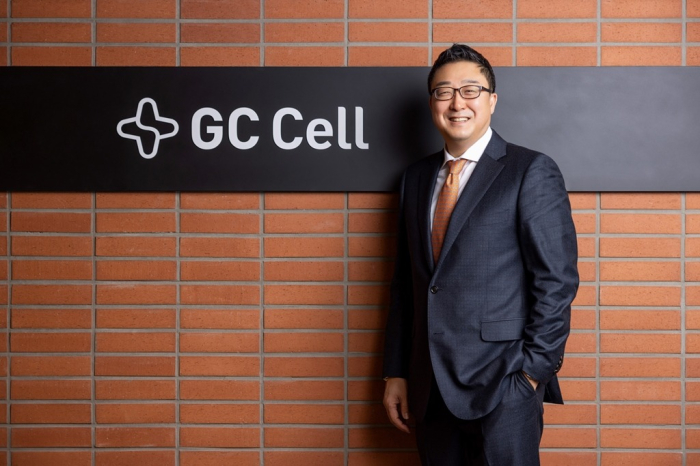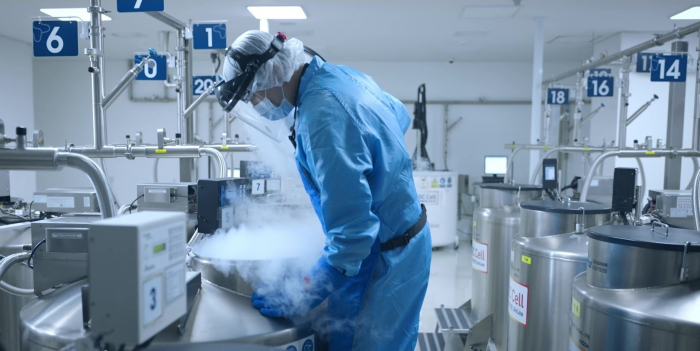Bio & Pharma
S.Korea’s GC Cell targets global cell therapy CDMO business
GC Cell seeks out-licensing of Immuncell-LC, a T-cell immunotherapy treatment for liver cancer, to the US and Europe
By Dec 12, 2023 (Gmt+09:00)
3
Min read
Most Read
LG Chem to sell water filter business to Glenwood PE for $692 million


KT&G eyes overseas M&A after rejecting activist fund's offer


Kyobo Life poised to buy Japan’s SBI Group-owned savings bank


StockX in merger talks with Naver’s online reseller Kream


Meritz backs half of ex-manager’s $210 mn hedge fund



GC Cell Corp., an affiliate of South Korea’s major pharmaceutical company GC Biopharma Corp., is targeting the cell therapy contract development and manufacturing organization (CDMO) business for global bio-industry leadershop while seeking exports of its adjuvant therapy for liver cancer, its head said on Monday.
“We will accelerate the cell therapy CDMO business to grow into a global company,” GC Cell President and CEO James Park told The Korea Economic Daily in an interview.
Park handled the global sales of Samsung Biologics Co., the world’s top contract manufacturing organization, before joining GC Cell in January. He played a key role in securing orders from the world’s 20 largest multinational pharmaceutical companies at Samsung.
GC Cell is set to focus on chimeric antigen receptor (CAR) T-cell therapy, a type of cancer immunotherapy treatment that uses immune cells called T cells that are genetically altered in a lab to locate and destroy cancer cells more effectively.
“Only one out of six CAR T-cell therapies sold in the US are available in Korea because of strict manufacturing conditions,” Park said. “Demand for CAR T-cell CDMO in Asia is pretty strong among global major pharmaceutical companies.”
BIG PHARMA COMPANIES SEEK MORE PRODUCTION BASES
The CAR T-therapy, a customized medicine produced with patients’ blood, is regarded as a future anticancer drug as it kills cancer cells like guided missiles. The therapy is produced through complicated manufacturing processes and administered after rigorous quality tests.
Novartis’ Kymriah, the only CAR T-cell therapy available in South Korea, is manufactured at its plant in the US state of New Jersey with the blood of patients in the Asian country sent there.
Johnson & Johnson Innovative Medicine won approval for its CAR T-cell therapy Carvykti in March from the South Korean authority, but the company formerly known as Janssen Pharmaceuticals has yet to sell it.
“Multinational pharmaceutical companies planned only one or two CAR T-cell therapy plants before,” Park said. “But they now plan to have production bases in various countries as the market for CAR T-cell therapy, a tailored treatment, is growing.”
IMMUNCELL-LC
GC Cell can compete in the business as it has been producing its Immuncell-LC, a patient-derived autologous T-cell immunotherapy for liver cancer, Park said.
Immuncell-LC, a customized anticancer drug made from a patient’s blood, received approval for liver cancer immunotherapy from South Korea’s Ministry of Food and Drug Safety in 2007. It also secured the US Food and Drug Administration’s orphan drug designation for the treatment of liver cancer, brain tumors, and pancreatic cancer.

The treatment has been used for about 10,000 patients so far without adverse reactions.
“Immuncell-LC is not much different from CAR T-cell therapy,” said Park. “Multinational pharmaceutical companies showed interest as we have produced a high-quality cell therapy and won approvals.”
GC Cell has Immuncell-LC production capacity for some 2,000 patients a year, he said.
“We expect to win deals next year since we have contacted all big pharma names with CAR T-cell therapy.”
The company is also seeking to license out the drug to the US and Europe, he said.
Immuncell-LC raised the survival rates of liver cancer patients, according to the results of clinical trials. The rate for the group of Immuncell-LC patients without relapse for 24 months after hepatectomies stood at 72%, while the rate of the placebo group was 54%. About 50-70% of liver cancer patients relapse after surgical treatments.
“Demand for Immuncell-LC continues to grow although new drug demand usually declines after being sold for more than 10 years,” Park said. “Multinational pharmaceutical companies are interested in technology transfer of the drug.”
GC Cell generated sales of 30.7 billion won ($23.3 million) from Immuncell-LC last year, out of total revenue of 236.1 billion won.
Write to Yoo-Rim Kim at youforest@hankyung.com
Jongwoo Cheon edited this article.
More to Read
-

-
 Korean chipmakersSamsung in talks to supply customized HBM4 to Nvidia, Broadcom, Google
Korean chipmakersSamsung in talks to supply customized HBM4 to Nvidia, Broadcom, Google20 HOURS AGO
-
 EnergyLS Cable breaks ground on $681 mn underwater cable plant in Chesapeake
EnergyLS Cable breaks ground on $681 mn underwater cable plant in ChesapeakeApr 29, 2025 (Gmt+09:00)
-
 Business & PoliticsUS tariffs add risk premium to dollar assets: Maurice Obstfeld
Business & PoliticsUS tariffs add risk premium to dollar assets: Maurice ObstfeldApr 29, 2025 (Gmt+09:00)
-

Comment 0
LOG IN


